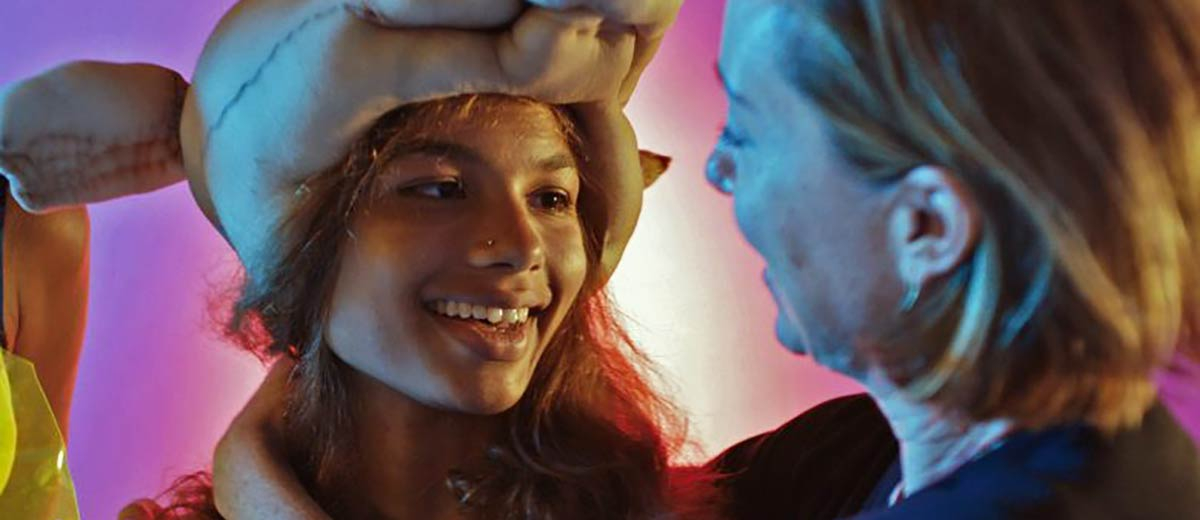
Helena Howard is a sensational find in ‘Madeline’s Madeline’
Written by: Fiona Underhill, CC2K Staff Writer
According to writer and director Josephine Decker, “There’s one primary relationship in every film: the relationship between the subject and the filmmaker… maybe when we’re performing we feel more like ourselves than we do in the Real World”. In Madeline’s Madeline, Decker brings us a blistering and uncompromising vision of both a teenage girl and an actress which not only explores the intersection of theatricality and psychology, but the complications that entails. Decker comes from both a documentary and theatrical background, and both of these skill-sets are on clear display here. Thanks to the surreal elements of her work, Decker was selected to make a short as part of the dream-adaptation feature film collective: unconscious (SXSW 2016), showing once again, the influence of the surreal and dreams is very clear on Madeline’s Madeline.
New discovery Helena Howard is the radiant star at the center of a solar system of fellow actors and the camera. Everything spirals around her and and is simultaneously drawn in by her gravity and pushed away by her force. She plays Madeline – a high school student who studies drama outside of school with a theatrical troupe run by Evangeline (Molly Parker). Both Madeline’s mother Regina (Miranda July) and Madeline herself suffer from mental health problems, which in Madeline’s case includes an eating disorder. There is also a definite blurring of the lines for Madeline when it comes to performing and she can take method acting too far. This is certainly exacerbated by Evangeline, who is not only fasciated with Madeline, but also has an inappropriately close relationship with the young girl. This involves her using Madeline’s dreams as well as her relationship with her mother as stimuli for the company’s newest performance piece.
It is so gratifying to see Molly Parker, who was so good in Michael Winterbottom’s 1999 film Wonderland, getting another challenging role here. Parker excels at playing this complex and flawed character. At the same time, Miranda July – a multi-hyphenate known for her stand-up, performance art, writing and directing gives a tender and vulnerable performance as Madeline’s mother who understandably worries for her daughter. Interestingly, Madeline’s Madeline doesn’t shy away from exploring the cycle of anxious mothers producing anxious daughters, which makes for uncomfortable viewing.

The way the film is shot is disorientating and dizzying- there is much blurring of the edges of the frame, making things dream-like and illusory. Decker also includes many close-ups of Madeline and shots from her point-of-view. There are sequences (including the opening) where Madeline finds herself experiencing dramatic improvisations as if they are reality, further confusing the lines between truth and artifice.
There is also the interrogation of the concept of creating something with your whole mind and body – where do “you” stop and where does the character begin? For those of us who were theater kids or drama students, there is much to relate to here. If you’ve ever experienced extended periods of improvisation or devising a collaborative piece, it is easy to start to lose yourself. This is one of very few films to explore an actor’s mental landscape, and also the level of trust young people place in their directors, teachers and the other adults working with them. The whole basis of many acting courses is to make yourself as open and vulnerable to emotions and experiences as possible, which can lead to participants beginning to question their own mental state.
The costume and production design are another strength of this film, particularly as it builds to its climax, which is set on multiple levels of a house. Masks and head-pieces are used to sometimes terrifying effect, and it becomes almost like a horror movie by the end. This will not be an easy watch for many and caution is advised for those who may be triggered by an intense exploration of the psychology of a teenager and the theatrical people around her. It is difficult to imagine what the experience of filming this was like, as the camera adds yet another layer to the world of the story. Decker does not shy away from exploring Madeline’s sexuality, which is particularly refreshing to see when the protagonist is a teenage girl.

Howard pushes boundaries throughout her performance and completely lays herself bare. This is a bravura debut on the same level as Timothée Chalamet’s breakthrough in last year’s Call Me By Your Name. It is hard to imagine for one second that the Academy will come knocking at her door, but we can at least be hopeful of a future career that showcases Howard’s obvious, enormous talent. It is one of the performances of the year which will hopefully highlighted at the Independent Spirit Awards.
Madeline’s Madeline is ultimately a difficult watch, but a rewarding one. All three central performances are extraordinary in a complex exploration of performance itself. It is a multi-layered examination of theater, through the lens of film – revealing the intense passion of those involved, whilst also being critical of the pushing of psychological boundaries. Both Decker and Howard are ones to watch for the future.
